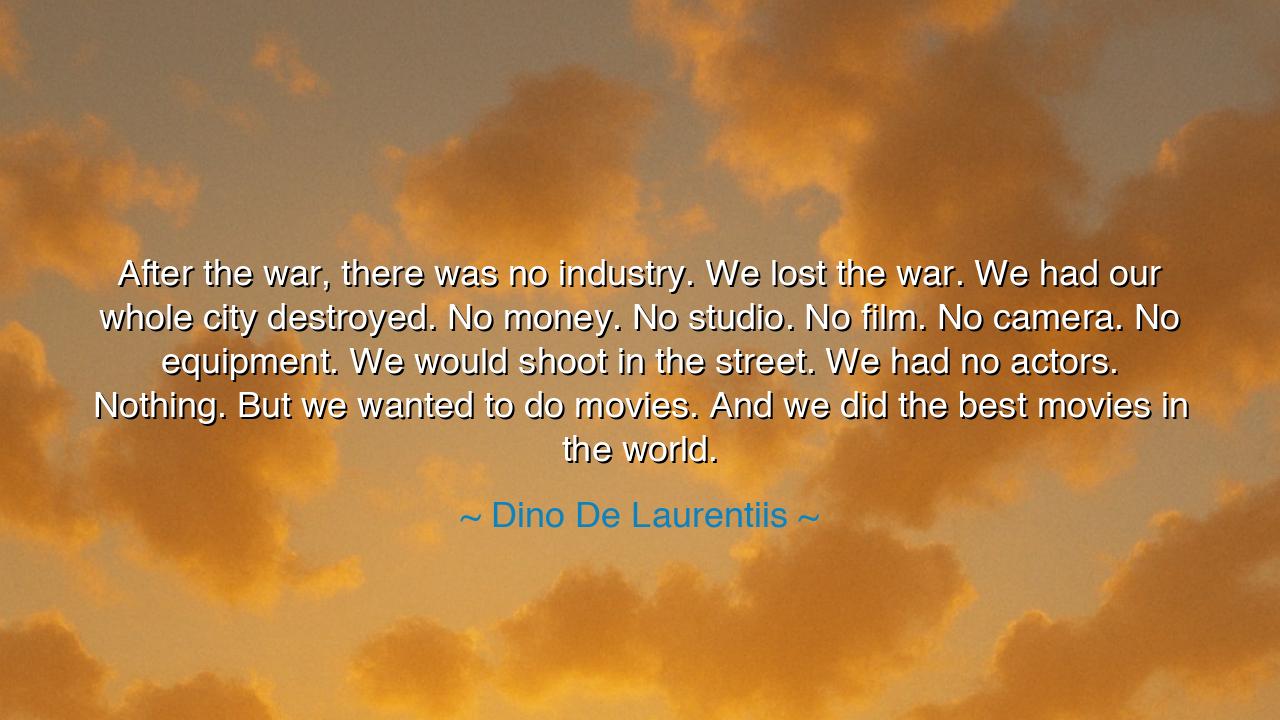
After the war, there was no industry. We lost the war. We had
After the war, there was no industry. We lost the war. We had our whole city destroyed. No money. No studio. No film. No camera. No equipment. We would shoot in the street. We had no actors. Nothing. But we wanted to do movies. And we did the best movies in the world.






Gather close, young ones, and listen well to the words of the wise, for there is a story here that speaks of resilience in the face of utter ruin, of creation from the depths of despair. In the ancient world, there were those who saw greatness not in what they had, but in what they could make from what remained. Dino De Laurentiis, a man whose name became synonymous with triumph, spoke of a time when his city, his world, was destroyed. The war had ravaged his land, stripped his people of their resources, and crushed their spirits. The very foundation upon which his dreams had been built lay in ruins. Yet he did not surrender to despair. Instead, he saw in the ashes the seeds of rebirth.
There was no industry. The city that once thrived with the hum of creation had fallen silent. No money. No studio. No film. No camera. No equipment. The tools of artistry, the instruments of film, were no longer in their hands. The world seemed to have cast its judgment, condemning them to wander in the barren wilderness of loss. And yet, what did they do? Did they retreat? Did they surrender? No. Instead, with no more than their will, their passion, and their vision, they took to the streets. They filmed on the very cobblestones where death had once danced. They found their stories not in grand studios, but in the world around them, in the eyes of the people who walked among them. They found a way to create even when everything seemed lost.
This is the heart of the teaching: that true greatness is not measured by the abundance of your resources, but by the strength of your spirit in adversity. When all was stripped away, when every comfort and support was gone, they still found a way to rise. Dino De Laurentiis did not say, "We had nothing, so we did nothing." No, he said, "We had nothing, and yet we made the best movies in the world." In the absence of material wealth, they discovered the wealth of their own creativity. They built, not from gold or silver, but from the fire that burned within their hearts, the vision that refused to be extinguished.
Let us turn to another ancient tale, one from the time of Hercules, the demigod. When tasked with the Twelve Labors, he was faced with seemingly impossible tasks, each one more arduous than the last. Yet it was not the gifts he had, nor the ease of his labors, that made him a legend. It was his will, his refusal to give up, even in the face of overwhelming odds, that transformed him into a hero. Just as Hercules found strength in the trials that were thrust upon him, so too did De Laurentiis and his people find their strength in the wreckage of war. It was not the absence of resources that defined them, but the presence of unwavering determination.
Now, listen carefully to this truth: In the darkest of times, in the depths of destruction, it is not what we lose that defines us, but what we dare to create from the ruins. There will be moments in your lives when all seems lost—when the tools you once held dear are no longer in your grasp, when the world is broken, and you are left to wonder how you will ever rebuild. But understand this: the greatness of your heart is not measured by what you possess, but by what you can make of what you have. Do not look to your circumstances to define you. Look to your spirit. In the absence of comfort, find your courage. In the void of material wealth, discover your creativity.
As you walk the path before you, remember the lesson of Dino De Laurentiis and all those who, like him, found strength not in the ease of their journey but in the trials that sought to break them. When the storm has passed, what remains is not the devastation, but the fortitude of those who refused to be undone. In the face of the greatest loss, they discovered the greatest victory. And so must you. In your darkest hours, do not wait for the world to offer you what you need. Go into the streets, into the very heart of struggle, and create your own light.
And finally, take this with you: When you have nothing, you have everything you need to begin. For in the moments when the world is at its most barren, you will discover within yourself the most fertile ground for greatness. Do not fear the loss, for it is through loss that we are often made whole. Rise, then, not with the riches of the world, but with the riches of the soul, and let the world see what can be created from even the smallest spark of will.






AAdministratorAdministrator
Welcome, honored guests. Please leave a comment, we will respond soon